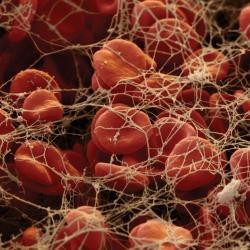Idiopathic thrombosis is a multi-factorial disease that occurs when a person predisposed to thrombosis (e.g. thrombophilia) is exposed to recognized clinical risk factors.
Thrombophilia is not a disease in itself, but may be related to a medical condition (e.g. cancer), exposure to drugs (e.g. contraceptives), other factors (e.g. pregnancy or postpartum) or thrombophilia may also be hereditary (predispostion).
Thrombophilia may also be associated to a small extent (<2%) with spontaneous abortions and stillbirth or possibly other pregnancy complications.
Presently, there is no single laboratory test or specific set of tests to determine all types of thrombophilia and testing for thrombophilia is based on clinical evidence-history and therefore is necessarily personalized. Testing for thrombophilia in non-selected patients (in the general population) is pointless and should not be applied.
For the comprehensive laboratory testing of thrombophilia it is recommended internationally to assay the levels of known hemostatic coagulation factors in plasma (e.g. fibrinogen, prothrombin time, etc.) and the genotypes 6-7 specific gene mutations/polymorphisms:
- Factor V Leiden,
- Factor V R2,
- Prothrombin G20210A,
- MTHFR C677T,
- MTHFR A1298C,
- PAI 4G/5G,
- Factor XIII V34L,
which have been associated, each to a different degree, with the genetic risk (predisposition) for thrombophilia
Testing for other gene mutations/polymorphisms, which have no proven association with thrombophilia (e.g. ACE I/D, β-Fibrinogen -455 G>A, APOE e2/e3/e4, ApoB R3500Q, etc.), is not recommended and leads to totally erroneous risk assessments.
Finally, it is important that the final report of the laboratory results for thrombophilia, and in particular of genetic testing, state clearly the estimated risk, in order to facilitate the proper clinical management of each case.
The generalized ‘prophylactic’ administration of anticoagulants, without any strong supporting evidence and especially during pregnancy, is considered dangerous and according to international guidelines is not recommended.
InterGenetics, in line with international recommendations, also offers a series of routine coagulation blood tests for thrombophilia, which is recommended to be performed in parallel with the genetic risk assessment for thrombophilia.
